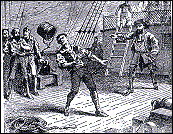The Legend of Captain
 The Legend of Captain William Kidd
The Legend of Captain William Kidd
His legend begins…
Doomed to an infamy undeserved, his name reddened with crimes he never committed, and made wildly romantic by tales of numerous treasures he may not have hidden, Captain William Kidd is fairly entitled to the sympathy of posterity and the apologies of all the ballad-makers and alleged historians who have obscured the facts in a cloud of fable. For three centuries his grisly phantom has stalked through the legends and literature of the black flag as the king of pirates and the most industrious depositor of ill-gotten gold and jewels that ever wielded a pick and shovel. His reputation is simply prodigious, his name has frightened children wherever English is spoken, and the Kidd tradition, or myth, is still potent to send treasure-seekers exploring and excavating almost every beach, cove, and headland between Nova Scotia and the Gulf of Mexico.
Fate has played the strangest tricks imaginable with the memory of this seventeenth century seafarer who never cut a throat or made a victim walk the plank, who was no more than a third or fourth rate pirate in an era when this interesting profession was in its heyday, and who was hanged at Execution Dock for the excessively unromantic crime of cracking the skull of his gunner with a wooden bucket. 
As for the riches of Captain Kidd, the original documents in his case, preserved among the state papers of the Public Record Office in London, relate with much detail what booty he may have had and what he did with it. Alas, they reveal the futility of the searches after the stout sea-chest buried above high water mark. The only authentic Kidd treasure to date had been dug up and inventoried almost 300 years ago, and not the slightest clue to any other been found since then UNTIL NOW.
These curious documents, faded and sometimes tattered, invite the reader to thresh out his own conclusions as to how great a scoundrel Kidd really was, and how far he was a scapegoat who had to be hanged to clear the fair names of those noble lords in high places who were partners and promoters of that most unlucky sea venture in which Kidd, sent out to catch pirates, was said to have turned amateur pirate himself rather than sail home empty-handed.
In English fiction there are three treasure stories of surpassing merit for ingenious contrivance and convincing illusion. These are Stevenson’s “Treasure Island”; Poe’s “Gold Bug”; and Washington Irving’s “Wolfert Webber.” Differing widely in plot and literary treatment, each peculiar to the genius of its author, they are blood kin, sprung from a common ancestor, namely, the Kidd legend. Why this halfhearted pirate who was neither red-handed nor of heroic dimensions even in his badness, should have inspired more romantic fiction than any other character in American history is past all explaining.
Yet in spite of it all, and as Ross Martin now explains it, the treasure lived up to its legend.
And so, his legend continues…

